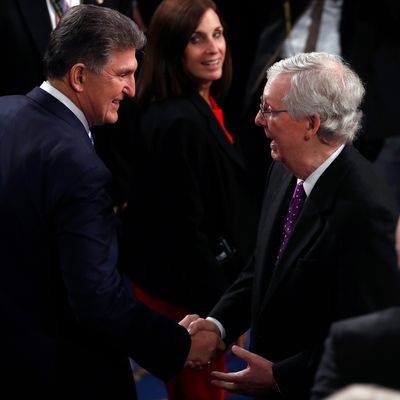
As Democrats debate whether they should take off the kid gloves in dealing with Joe Manchin or just surrender and let him shape their key legislative priorities, the very powerful West Virginian looks very different from the other side of the partisan barricades. Senate Republican leader Mitch McConnell, who would become majority leader again if Manchin switched parties overnight, clearly now senses an opportunity. “Obviously we would love to have him on our team,” McConnell told reporters this week. “I think he’d be more comfortable.”
McConnell subsequently elaborated on his offer in an interview with Hugh Hewitt, hinting that Manchin might be able to retain his chairmanship of the Senate’s Energy Committee if he flipped:
This appeal to Manchin’s comfort level is motivated in part by reports that he was grievously offended by supposedly disrespectful comments made about him by White House staff — comments that primed him to blow up Biden’s Build Back Better package.
Does the idea of a party switch right now make any sense for Manchin, though?
Put aside for a moment any sentimental attachment Manchin might have to the Democratic Party. He is from one of those many southern and southern-adjacent states where whole generations of conservative Democrats switched parties the moment it became politically convenient for them. Yes, it might gall Manchin to find himself suddenly in the same party as his bitter rival (and gubernatorial successor) Jim Justice. But that wouldn’t be new: Justice ran as a Democrat when he was first elected governor in 2016.
As for “comfort levels,” Manchin is positioned in a no-pol’s-land where if he did switch, he’d go from being the most conservative Democrat in the U.S. Senate to being one of the most liberal Republicans. During the Trump administration, he voted with the 45th president’s positions about half the time, less than any Senate Republican. And his support for higher tax rates on the very wealthy, and for Medicare prescription-drug price-negotiating powers, are anathema to most in the GOP.
So the best way to look at a hypothetical party switch from Joe Manchin’s point of view is to consider the hard cold facts of what it would do for him in Washington and in West Virginia.
First of all, it should be recognized that Manchin is currently in the catbird seat in the Senate, as reflected by the iron grip he holds over Democrats in both chambers and in the White House. If he flipped, he could presumably wring some concessions from McConnell. But he won’t have the ability to shape legislation that has a chance of enactment, and will be just one of 51 obstructionist Republicans. That’s not a great deal of fun. So becoming a Republican right now would represent a huge drop in his power, perhaps offset a bit by a few weeks of lionization by conservative media (which he’s pretty much receiving anyway).
Second of all, he’s not up for reelection in West Virginia until 2024, when he will be 77 and must decide whether he really wants to be an octogenarian senator. Why not enjoy his power over the Democrats whose governing trifecta depends on him so long as it lasts, and then reconsider his position after the midterms? If, as is widely expected, the trifecta is lost in 2022, Manchin could become a Republican in plenty of time to run two years later on the ticket of the party that totally dominates his state. And if Democrats still control the Senate after the midterms, which is entirely possible, Manchin would still have the option of flipping control to Republicans and naming his price for giving McConnell the gavel. (That price would definitely include discouraging any Republican primary opposition for Manchin in West Virginia.) Indeed, even if Republicans win back the Senate in 2022, the flexibility afforded by an additional seat might still give Manchin some leverage. But his leverage with Democrats will probably drop to zero once the trifecta is gone.
No matter what sort of calculation he is making for the future, Manchin can continue to talk to leaders of both parties this next year, keeping critics at bay and enhancing the perception of his inordinate power for the benefit of the folks (and the business interests) back home. It makes little sense for him to make any irrevocable moves right now. Indeed, for all the frustration he has caused his fellow Democrats, these remain the best of times for Joe Manchin.






























